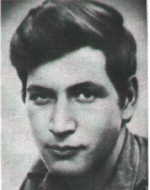Adar, Dov (“Dubi”)
The late son of Yehuda Katz and Hanna was born on June 22, 1950 in Tel Aviv. His father was a grandson of one of the founders of Rosh Pina, and his mother was the daughter of Arthur Herzog, one of the leaders of Czech Jewry. In the summer of 1953, his father died during his service. His mother later married Haim Adar, his father’s close friend. Dubi adapted to life willingly, and Chaim devoted himself to the child with all the warmth of his Lev, served him pain and adopted him white. When he was a teddy bear, he was drawn to village life and to animals and loved to stay at his aunt’s home in the moshav and to help with work, in the chicken coop and in the barn. He studied at the AD Gordon School in Tel Aviv, The life of the house, the stories of friends and visitors about the life of Yehuda Katz, the annual visits to the memory of the fallen of the air force, trips to Israel with the order of Jabotinsky – all these deepened the love He began to take an interest in political questions and went deeper into thinking about them, but his love of agriculture did not diminish During his studies in the field of flora and fauna, he expanded his education on the history of the Jewish war for their independence, and read a lot about the undergrounds and the War of Independence, In addition to his leadership skills, he also began to strive to achieve things that seemed right and right before he finished his studies in Pardes Hanna, where he began to dream about establishing a cattle farm near Rosh Pina. On the day of graduation at the agricultural school, Dubi had a typical idea of financing the graduation party. He and his friends asked for a plot of land; They worked it during the season and at the Tnuva win they held the party. After the graduation party, early in the morning, Dubi went to milk the cow for the last time. Dubi was drafted into the IDF in August 1968. At first he said to enlist in the Border Police, “where I can literally fulfill the idea of preserving the borders of the homeland,” but later decided to join the commando unit because he believed it would be fulfilled. The unit opened up to him a world of activity of his own – field, journeys, new friends, and friendship that was so close to brotherhood that he became absorbed in the study of martial law, completed a course after a course, until he reached the officers’ course. The new one, which was created after the Six-Day War, changed the nature of the Unit’s operations, and it dealt mainly with ambushes in the schools in the Beit Shemesh Valley And when he was in Tel Aviv to recruit new soldiers to his unit, he was called by telephone to return to his mother’s home, and to his mother he said: “Do not worry, I’ll come back. In two days. “On December 31, 1971, in the midst of a battle to liquidate a terrorist base in the village of Al-Hayyam, across the Lebanese border, Lt. Dubi was wounded by a bullet fired from a house he and his soldiers had stormed. He was laid to rest in the military cemetery in Kiryat Shaul. In a letter sent to his parents, the defense minister wrote the following: “He was an excellent soldier, an excellent officer and an exemplary friend, and Dov was loved by his commanders and subordinates.”
